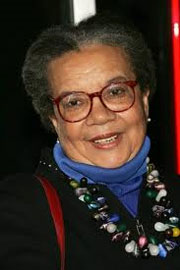
Child Watch
All children deserve teachers who care about them
By Marian Wright Edelman
“You see a lot of teachers judge and stigmatize their students based on where they come from. A lot of my teachers thought that since I was from the South End of Louisville and I grew up in Section 8 housing that I wasn’t capable of doing all the things that I did, and the first time that I really felt like I was someone, it was the first time my fifth grade teacher actually pulled me to the side and said, ‘What can I do for you to help you as a student?’ And I ask my students that now. I pull them to the side and I say, ‘What can I do as an adult to help you?’. . . I feel like every time I talk to someone, I should instill something in them, and I want that in return. And that happens just through treating people with love.”
As children across the country are returning to their classrooms, Janol Vinson is part of the next generation of educators and administrators who will be shaping our children’s future. He recently received his bachelor’s degree in middle grades education from Northern Kentucky University and is now pursuing a master’s degree in higher education administration at Florida International University. Janol spoke at a recent symposium convened by the Educational Testing Service (ETS) and the Children’s Defense Fund on “Black Male Teens: Moving to Success in the High School Years” on how he found his own calling in education and his passionate belief in the need for training teachers who love, respect, and set high expectations for every child.
Janol explained that his grandfather, a pastor, helped set the stage for Janol’s success in school with high expectations. His grandfather didn’t have the opportunity to go to college until he was in his mid-40s: “Hearing the stories from my grandfather talking about the [Civil Rights] movement and talking about the things that he sacrificed for my education . . . He set that expectation for me, just saying, ‘You owe this to your family. You owe this to your community. It’s not this is what you should do’—he sat down and said, ‘this is what you are going to do.’ . . . So by the time I did get to high school, I knew . . . I need to make an A in this class because that’s what my grandfather expected from me.”
Janol’s good grades allowed him to attend an excellent magnet high school but he realized he didn’t have any Black male role models there or see his own experience reflected in the curriculum, where, he says, “the first time I saw an African American male in my textbook was as a slave.” He didn’t get to see how a school could go beyond providing an education to transforming lives. When as a young college student he attended a week-long training to serve as a servant leader intern teaching children in the Children Defense Fund’s Freedom Schools® summer enrichment program, the light bulb went off: “What I saw changed my life forever. Seeing thousands of young people who were excited about enriching the lives of students in grades K through 12 excited me, and the fact that it was all based around reading really just changed my whole mindset on how I viewed education, how I viewed the movement. And by the end of that summer, during my first year of Freedom Schools, I realized that my calling really was to give back to my community and help young people love to read.” Now, “[I] make sure that I set the [high] expectations. So now with my students at my site, I don’t say, ‘This is what you should do’. . . I say, ‘This is what you’re going to do.’”
Janol is now an Ella Baker Trainer in the Freedom Schools program teaching others how to inspire a love for learning in children and he wants to see a new kind of teacher training become a priority throughout the educational system.
“We need to put more emphasis on helping teachers become better educators—not just teaching a curriculum, but actually educating a child and showing them ways to critically think not only about their curriculum, but about their community and being change agents through academia. We need more trainings for teachers to understand how to analyze curriculum and instruct it and facilitate it in a way where it’s actually connecting to their students. And that’s what is lacking so much in our school system today, the fact that students are not connecting to what they see . . .
“Students are getting punished based on a teacher who either doesn’t care about them or just doesn’t know what they’re doing. And a lot of these teachers have great degrees—and I think it’s great if you go to an Ivy League [university] and you get a degree in education, but . . . Your credentials cannot educate a child. It’s your heart and your love for that child to get an education. And once we realize that teachers are the main vehicles to help children as a whole, that’s when we’re going to honestly see a change, when we have equitable funding for all teachers and all school systems, because all children deserve a valuable education, and all children deserve teachers who care about them.”
